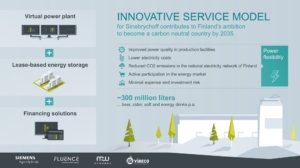Siemens expands virtual power plants to industry with new Sinebrychoff contract
In a move that brings new market opportunities for industrial players, Siemens has developed a unique business model to support the next level of energy optimization for Finnish brewery Sinebrychoff, a subsidiary of the international Carlsberg Group. At the heart of the solution, which will be implemented at Sinebrychoff’s plant in greater Helsinki, is a virtual power plant (VPP) and the latest energy storage technology, supported with financing solutions, to create one of the first examples of power flexibility in an industrial site.
The innovative model required close cooperation between a number of entities. For financing solutions, Siemens Smart Infrastructure (SI) partnered with Switzerland-based MW Storage International AG, which secured the initial project investment, and Siemens Financial Services (SFS) to bring in its risk management and deal structuring expertise. MW Storage International owns a 69 percent stake in the project. SFS created the financial and legal framework, co-developed the business model, and enabled the VPP setup through smart financing. Fluence, a joint venture of Siemens and AES, is contributing its 20-megawatt Edgestack energy storage system to the plant, designed specifically for commercial applications. Vibeco, a subsidiary of Siemens Finland specializing in VPPs, will supply the trading platform to enable energy transactions.
Lease-based energy storage
www.siemens.com/smart-infrastructure



